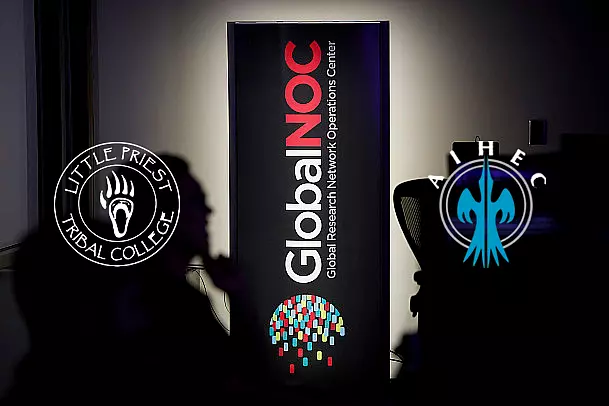In an era when digital connectivity is a cornerstone of educational success, Indiana University’s GlobalNOC is working with the American Indian Higher Education Consortium to bridge the technological gap for tribal colleges and universities.
Little Priest Tribal College, a public tribal land-grant community college in Winnebago, Nebraska, took part in the GlobalNOC Light pilot project, which offers network visibility with minimal setup and maintenance effort.
“GlobalNOC learned a great deal from the project and seeks to grow its relationships with TCUs,” said Corey Donovan, GlobalNOC client relationship manager. “We seek to establish transparency and commitment in our efforts to establish meaningful connections and trust within these communities.”
GlobalNOC Light, GlobalNOC’s newest service, specifically targets small to mid-sized colleges with limited IT resources. Resource constraints at tribal colleges and universities can make it difficult to allocate time for the tasks required to get the service running, further complicating progress.
“As a small TCU, Little Priest Tribal College does not have the resources to support a network operation center 24 hours a day and seven days a week,” said Morri Conway, director of computer systems and technology for the college. “The Indiana University GlobalNOC has provided a path for LPTC to have network monitoring 24/7.”
Little Priest Tribal College started out on a pilot program with GlobalNOC Light to work out any issues and was satisified enough from the experience to use the service.
“We are very impressed and excited to be continuing our services with the GlobalNOC,” Conway said. “I would also like to thank the American Indian Higher Education Consortium for connecting our schools together to provide LPTC with much-needed assistance.”
Unlike other products, GlobalNOC Light includes human monitoring, which sets it apart by offering proactive engagement during critical network issues to assist its partners.
“The tribal colleges and universities are smaller campuses that primarily serve rural and under-resourced communities,” said Alex Grandon, STEM coordinator for the American Indian Higher Education Consortium. “Many of the national continuous integration resources available to tribal colleges are either too large or multifaceted for practical use by smaller institutions, or they are cost prohibitive, or both. The GlobalNOC Light service provided practical, affordable, frontline networking monitoring for TCU campus networks that could then better redirect their limited resources to other priorities with greater peace of mind.”
Since its inception in 1998, GlobalNOC has grown to support more than 20 networks at global, national, regional, metro and campus scales. GlobalNOC’s supported networks include Internet2’s national R&E network, NOAA’s enterprise networks, International Networks at IU, and numerous state and local networks.
GlobalNOC Light hopes to reach other institutions by providing its network visibility and support to bridge the technological gap.
“There is great potential for growth and continued efforts to engage more tribal colleges and universities, historically Black colleges and universities, and Hispanic-serving institutions,” Donovan said.



